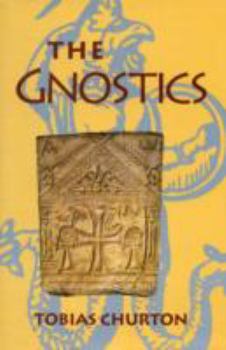The Gnostics
Select Format
Select Condition 
Book Overview
No Synopsis Available.
Format:Hardcover
Language:English
ISBN:0760704783
ISBN13:9780760704783
Release Date:January 1997
Publisher:BARNES & NOBLE
Length:188 Pages
Weight:0.80 lbs.
Dimensions:1.1" x 8.5" x 5.8"
Customer Reviews
2 ratings
The golden thread connecting Gnostic traditions
Published by Thriftbooks.com User , 17 years ago
"Gnosis is one of the great alternatives in looking at the whole scheme of things and our place in it ... The very fact that the Gnostics probably were the first who saw the theme of the stranger in the world. That makes them, the Gnostics, a world historical event. That theme never disappeared again. It can then re-emerge again and again ..." Hans Jonas Coptic Gnostic Codicies: Tobias Churton started his story in Tabinnisi at a Pachomian monastic community, with Abbot Theodore reading Athanasius Festal letter of 367, when the cannon of the New Testament was sealed for the first time. Extra curricular, speculative apocrypha books were banned, and should have been probably disposed of in nearby cemetery, to be found 16 centuries later. While Tobias gave a vivid account of the discovery, smuggling, and recovery of those amazing codices, he did not fail to point at the heroic effort of the two Coptic Curators, Togo Mina and Pahor Labib with Egyptian Coptologists Victor Girgis, and Yassa Abdel-Masih. He gives them credit to restore their own national cultural treasures seeking help from their fellow French, Dutch, and German colleagues. Gnostic Founding Fathers: The Gnostic higher reason starts with Valentinus, who claimed to have been instructed by a direct disciple of one of Jesus' apostles, and Plotinus, the Egyptian founder of Neoplatonism, born in 204 C.E. in upper Egypt. Plotinus developed a complex spiritual cosmology involving three hypostases: the One, the Intelligence, and the Soul. It is from the productive unity of these three Beings that all existence emanates. Plotinus is not a strict pantheist, yet his system cosmology, developed a unique theory of sense-perception and knowledge. It is a question of some interest about the course of Christian doctrine might have been, had Valentinus been elected to the office of bishop of Rome. During the dark and hopeless years of World War II, the inspiration, and comfort derived from Valentinus writings were instrumental in turning Quispel, into a sympathetic and devoted scholar of Gnosticism. Salvation by Gnosis: From earliest times Messengers of the Light have come forth from the True God in order to assist humans in their quest for Gnosis. Only a few of these salvific figures are mentioned in Gnostic scripture; some of the most important are Seth (the third Son of Adam), Jesus, and the Prophet Mani. The Gnostic concept of salvation, may easily be mistaken for an unmediated individual experience. On the one hand, Gnostic salvation is a sort of personal spiritual experience, Like most of other concepts, is a subtle one. Gnostics hold that the potential for Gnosis, and thus, of salvation is present in every man and woman, and that salvation is not vicarious but individual. At the same time, they also acknowledge that Gnosis and salvation can be stimulated and facilitated in order to effectively arise within consciousness. The majority of Gnostics looked to Jesus as the Cosmic savior (Pan Sot
A Mystery tour of the Higher Reason
Published by Thriftbooks.com User , 20 years ago
For a book that was written to accompany a television series (The Gnostics on Thames TV in Britain) this introduction to Gnostic thought is really quite well done. I've read it through twice now and my opinion of it has not changed. While the account starts with the finds at Nag Hamadi, Egypt and traditional Gnosticism this book goes for beyond. The author states that he sees the golden thread that connects all great intuitive esoteric conditions. Indeed, he goes on to trace the thread to the Hermetic tradition, the Cathars, the Renaissance Magi, William Blake, the Rosicrucians, Freemasons, Theosophists, The Golden Dawn, and Jung. Some scholars seem to be overwhelmed by this vast chain of interconnection, but personally, I believe that a good case is made. The same perennial philosophy connects all. Indeed, it far predates the period of the traditional Gnostics that the church fought so hard to exterminate. Oh yes, what is "gnosticism?" It is intuitive spiritual knowledge emanating from a higher source. It is the knowledge of higher underlying reality coming from higher worlds. It is direct intuitive knowledge, or recollection, of the Divine. Coming directly from Above, by way of Within, it does not readily lend itself to control and censorship by church bureaucracy and its worldly masters. This edition has eight pages of relevant illustrations in the center section. It also has two excellent appendices showing 1) a historical timeline from 427 B.C. to 1987, and 2) thumbnail descriptions of the contents of all codex's found at Nag Hamadi. There is also an informative bibliography for further study, as well as a full index in back.





